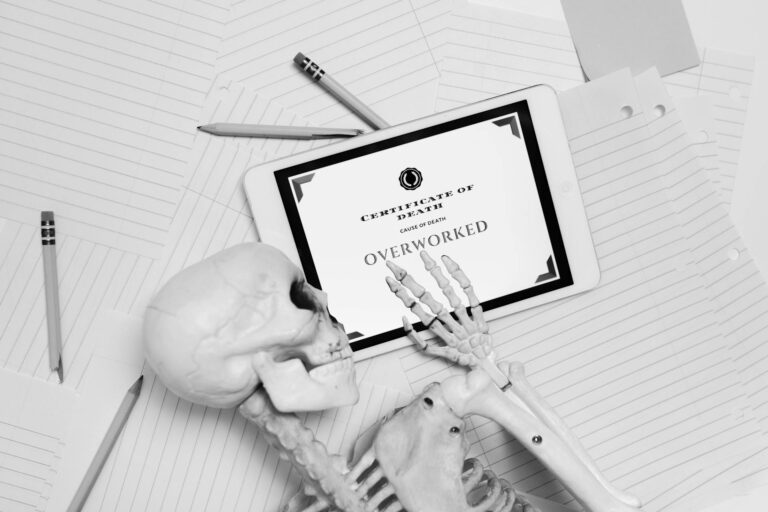Exam season is a challenging time for students, parents, and educators alike. The pressure to perform well can lead to overwhelming stress and eventual burnout if not managed effectively. Burnout doesn’t just affect academic performance—it impacts overall well-being, motivation, and mental health.
The good news? Burnout can be avoided with the right strategies in place. This blog will help you understand the signs of burnout, explore practical ways to take care of your mental and physical health and uncover techniques to stay productive without sacrificing your well-being. Whether you’re a student, a concerned parent, or an educator aiming to support your learners, this guide is here to help.
Recognizing Burnout Signs
Understanding the symptoms of burnout is essential. It’s your body and mind’s way of signalling that you’re overextending yourself. Burnout manifests across three main areas—physical, emotional, and behavioural.
Physical Signs
- Constant fatigue, even after adequate rest
- Frequent headaches or tension in your body
- Changes in eating or sleeping patterns
- Recurring illnesses due to a weakened immune system
Emotional Signs
- Feeling overwhelmed, unmotivated, or trapped
- Unexplained irritability or mood swings
- Difficulty concentrating or remembering information
- Frequent feelings of anxiety or hopelessness
Behavioural Signs
- Procrastination or avoidance of studying
- Reliance on caffeine, sugar, or other temporary energy boosters
- Decline in performance despite more study hours
- Withdrawing from social interactions
If these resonate with you or someone you know, it’s a signal to pause and recalibrate.
The Importance of Self-Care
Self-care isn’t a luxury—it’s a necessity, especially during high-stress periods like exam season. Prioritizing self-care helps you reset physically and mentally, making it easier to stay focused and productive.
Sleep Hygiene
A consistent sleep schedule (7–9 hours per night) is non-negotiable. Lack of sleep can impair memory and decision-making, which are critical during exams. Avoid studying late into the night and turn off screens an hour before bedtime to improve sleep quality.
Nutrition and Hydration
Your brain needs fuel to function. Prioritize whole, nutrient-dense foods like fruits, vegetables, nuts, and whole grains. Stay hydrated with water—limit sugary drinks and caffeine, as they can lead to crashes later.
Stress Relief Techniques
- Exercise: Even a 20-minute walk can boost endorphins and clear your mind. Yoga or stretching can also reduce physical tension.
- Mindfulness and Meditation: Apps like Headspace or Calm provide guided meditations perfect for relieving exam stress.
- Journaling: Write down your thoughts to organize your mind and reduce anxious feelings.
Small, sustainable changes can greatly improve how you feel and perform.
Time Management and Study Tips
Effective time management can reduce last-minute panics and create a sense of control over your workload.
Creating a Study Schedule
Organize your study materials by subject and prioritize topics you find challenging. Break your revision into manageable sessions (e.g., 25–50-minute blocks) with short breaks in between. This method, known as the Pomodoro Technique, improves focus and prevents fatigue.
Avoiding Procrastination
If you’re prone to procrastination, set small, achievable goals. Instead of saying, “I’ll revise biology today,” aim for something more specific, like, “I’ll learn photosynthesis and complete one practice question.” Each completed goal will boost your confidence.
Say No to Cramming
Instead of cramming, space out your learning. Research shows that distributed practice (spreading revision over several days) significantly improves retention. Review notes regularly to reinforce your knowledge.
Remember, exams aren’t about studying longer—they’re about studying smarter.
Seeking Support
You don’t need to handle exam stress alone. Knowing when and whom to turn to can make a big difference.
Talking to Friends and Family
Sometimes, sharing your feelings helps lighten the load. Your loved ones can provide emotional support and help you gain perspective.
Seeking Guidance from Educators
Teachers, school counsellors, or academic mentors are there to help. They can provide study resources, clarify doubts, or even create customized learning strategies for you.
Professional Help
If stress feels unmanageable, consider reaching out to mental health professionals. Many schools and universities offer counselling services, often free for students. There’s no shame in asking for help—it’s a sign of strength, not weakness.
Real-Life Examples
Emma’s Story
Emma, a college sophomore, found herself on the verge of burnout during finals. Overwhelmed and anxious, she began experiencing sleepless nights and panic attacks. After speaking with her academic counsellor, she revamped her study schedule, incorporated 10-minute morning meditations, and started exercising regularly. By exam week, Emma felt more in control of her time and confident in her preparation.
Jake’s Journey
Jake, a high school junior, struggled with procrastination and self-doubt. Instead of tackling his workload, he’d scroll through TikTok, leaving him rushed and underprepared. With guidance from a peer mentor, Jake adopted the Pomodoro Technique and realistic daily goals. He finished the term with improved grades and newfound self-discipline.
Stories like these remind us that burnout isn’t inevitable—it can be addressed with the right steps.
Exams Are Temporary; Health Is Forever
Exam season is a marathon, not a sprint. Prioritizing your well-being isn’t just about scoring better—it’s about setting yourself up for long-term success.
Start with small changes from the tips above. Consider your sleep, your study habits, and how you manage stress. Experiment, reflect, and adjust until you find what works for you.
If you found this post helpful, share it with a friend or fellow student who could use a boost. Feel free to leave a comment about your own experiences with burnout or tips that have worked for you.
Remember, exams are important, but nothing is more valuable than your mental and physical health. You’ve got this!





















0 Comments